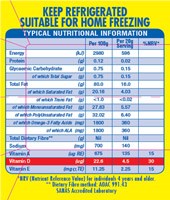The new Department of Health's legislation to limit artery-clogging artificial trans-fats (industrially processed trans-fatty acids) in all food products to a maximum of 2% in all foods could help South Africans become fat wise.
Though some trans fats occur naturally in meat and dairy, the new regulations specifically refer to artificially created (man-made) trans-fats and will apply to all food stuffs sold, manufactured in or imported into South Africa, as well food prepared in restaurants, fast food outlets and the catering industry.
Trans-fats have been identified by scientists worldwide (including the World Health Organization) as one of the major contributors to the global pandemic of chronic lifestyle diseases such as heart disease, diabetes, certain cancers and obesity. Trans-fats have a similar effect on the body as saturated fats and not only increase 'bad' (LDL) blood cholesterol but also decrease 'good' (HDL) blood cholesterol. In fact, there are no known health benefits from industrially processed trans-fat.
According to the Willowton Group, one of South Africa's largest manufacturers of cooking oil, margarine and spread brands, consumers need to become more aware of the effects that both healthy and unhealthy fats have on their bodies and then make the right choices when buying groceries or purchasing prepared food.
"The good news is that this legislation could change the shape of health for all. However, this doesn't mean that all fats should be avoided," warned Shoaib Moosa, sales and marketing director at Willowton Group.
"We need fat in our diets. It is a major source of energy for the body and aids in the absorption of essential vitamins A, D, E, K and carotenoids. Both animal and plant-derived food products contain fat and, when eaten in moderation, it is important for proper growth, development, and maintenance of good health. As a food ingredient, fat also provides taste, consistency and stability and helps us feel full."
Identifying trans-fats
The first - and most important - step is for consumers to be well informed. "Trans-fats are usually formed during the manufacturing process by heating liquid vegetable oils in the presence of hydrogen. This process, known as hydrogenation, produces 'partially hydrogenated' oils. Any food made with these contains trans-fat," he said.
Although trans-fats are found naturally in small amounts in animal products such as beef, pork, lamb, milk and butter, these trans-fats have not been linked to disease in the same way as the major source of trans-fats, which is 'partially hydrogenated' oil.
Examples of foods that may contain man-made trans-fats are processed foods made with "partially hydrogenated" vegetable oils such as potato crisps, baked goods and confectionary such as rusks, croissants, pies, crackers, cookies, doughnuts and muffins. Trans-fats can also be present in some margarines and baking shortening as well as deep fried French fries and chicken.
According to Moosa, trans-fats help to increase the shelf life of products and give food that creamy 'mouth-feel' that keeps people coming back for more. This process makes liquid vegetable oils hard enough to spread on bread. The oils are made more stable at higher temperatures and they then don't need to be replaced that often in commercial deep fryers.
The good news is that manufacturers have worked hard to lower the amount of trans-fats found in foods.
"While many commercial vegetable oils contain trans-fat, non-hydrogenated versions are available. Manufacturers, such as us are now using alternative technologies for the processing of vegetable oil that do not have harmful effects on health. In turn, this means that food manufacturers can now use more appropriate types of fats and oils in their products while consumers can replace harmful oils with others that are rich in omega-3 and omega-6 polyunsaturated and monounsaturated fats," he added.
Practical tips, check labels
However, the greatest concern amongst consumers is that they will be serving up harmful trans-fats without knowing it. "You won't know unless you check. Now, trans-fats must be listed on food labels along with other bad fats (saturated fats) and good ones (monounsaturated and polyunsaturated fats). The only way to know for sure if the oil, margarine or spread you use contains trans-fat is to check labels," Moosa advised.
Here are five practical tips to keep consumption of saturated fat, trans-fat, and cholesterol low while consuming a nutritionally adequate diet.
- Choose alternative fats. Replace saturated and trans-fats with mono- and polyunsaturated fats. These fats do not raise bad (LDL) cholesterol levels and have health benefits when eaten in moderation. Sources of monounsaturated fats include olive and canola oils. Sources of polyunsaturated fats include sunflower oil, grape seed oil and foods such as nuts and oily fish.
- Choose sunflower or vegetable oils (except coconut and palm kernel oils) and soft margarines (liquid, tub, or spray) and those that have less than 1 gram (<1 g) of trans-fats per 100 g.
- Consider fish. Most fish are lower in saturated fat than meat. Some fish, such as mackerel, sardines, pilchards, snoek and salmon, contain beneficial omega-3 fatty acids.
- Choose lean meats, such as poultry (without skin, not fried), lean beef and pork (trim visible fat, not fried).
- Read food labels. Food labels illustrate total fat, saturated fat, trans-fat, and cholesterol content for selected food products. Check the Ingredient list for "partially hydrogenated" oils. Trans-fat is listed on the Nutrition Information table directly under the line for saturated fat. Now take a look under the 100 g column and aim for less than 1 gram of trans-fats per 100 grams of product.












































